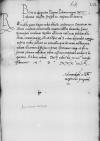[Reverendo in Christo] Patri, domino ⌊[Ioanni Dei gratia episcop]o Culmensi⌋ [sincere] nobis dilecto
⌊Bona, Dei gratia regina⌋ ⌊Poloniae⌋, magna dux ⌊Lithvaniae⌋, ⌊Russiae⌋, ⌊Prussiae⌋ ac ⌊Masoviae⌋ etc. domina.
Reverende in Chriso Pater, sincere nobis dilecte.
Misimus in ducatum nostrum ⌊Masoviae⌋ ad nonnulla negotia nostra obeunda hunc generosum ⌊Nicolaum Grabia⌋, aulicum nostrum fidelem dilectum, commisimusque illi, ut istuc ad Paternitatem Vestram descendat eamque nostris verbis salutet ac nonnulla, quae de mente nostra procedunt, illi coram diffusius referat. Hortamur itaque, ut ⌊illi⌋ referenti plenam adhibeat fidem, ac si nos praesentes audiret loquentes.
Datae
⌊Vilnae⌋, die XVIII-a mensis Februarii M-o D-o XXX-o IIII-o.
Ad mandatum sacrae ⌊maiestatis reginalis⌋ proprium

